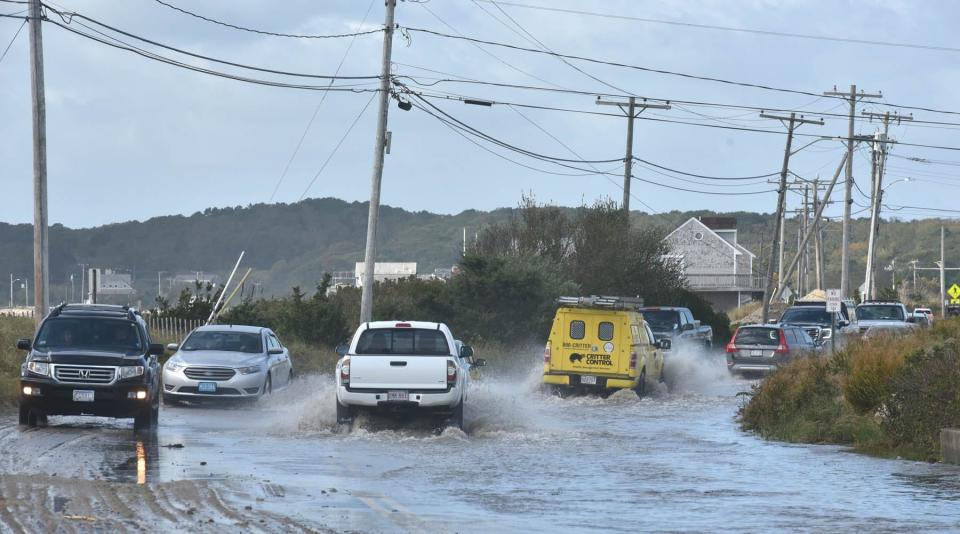Here are ways Cape Cod schools are teaching students to combat changes to ocean, beaches
Climate change is no longer a distant problem for the next generation to tackle.
The effects of climate change on Cape Cod and the Islands are already evident, with summer drought, storm erosion threatening homes and more reports of dolphin strandings and other threatened marine life.
So how are local schools preparing today's youth for an uncertain future?
From classroom studies of weather to hands-on sampling of rivers and streams, Cape schools are connecting human behavior with environmental impacts, some more obvious and immediate on the Cape than others.
"Our whole focus is on stewardship and consciousness to ensure that students care for the environment and engage in conversations about how their actions always have a reaction, visible in the environment," said Falmouth Assistant School Superintendent Sonia Tellier.

Climate change is part of the state's third and eighth grade standard curriculum and all grades discuss human activities and their impact on nature. The Massachusetts standards are an adaptation of the "Next Generation Science Standards," based on the Framework for K–12 Science Education created by the National Research Council of the National Academy of Sciences.
"For third grade, under the earth and space science unit, we address how the weather and climate affect our lives, while in the engineering unit, the focus is on the protection of animals and other living organisms," said Amanda Bardsley, the curriculum director for Nantucket Public Schools.
SPECIAL PROJECT: The climate future is now. Humans navigate a ‘Perilous Course’ on the East Coast.
According to Bardsley, in the eighth grade, as part of the Earth and space science unit, students extensively work on the impact of human activities such as deforestation, the increase in global temperature, and fossil fuel combustion, among others.
Along with state-required courses, several high schools across the Cape offer elective courses with a heavier focus on climate change and its impact on the Cape.

"Courses such as coastal ecology, offered at the high school level, are designed specifically to study Cape Cod," said Jennifer Caron, the science curriculum coordinator for grades six through 12 at Barnstable Public Schools. "Whether it is courses like AP biology or AP environmental science, we spend a great deal of time on global and local impacts of climate change. Being on Cape Cod, it's hard not to focus on the impacts."
Tellier, in Falmouth, said courses such as marine ecology are specifically designed for local students.
"Understanding what happened to the oceans and the coastline is important for students here because of the unique geographical nature of the Cape," she said.
Angry youth: Saniyah Bolton wants to lead, advocate for minorities amid climate change
More: Some are students, activists. Some are just worried sick. Climate crisis is all they know.
Barnstable High School offers an environmental science and technology pathway, approved by the state.
"About 80 students are involved in the program, and their focus is on sea level change, ocean acidification, and the overall impact of climate change," said Caron.

Cape schools partner with local climate change groups
Several schools across the Cape and Islands partner with local nonprofits and climate-focused agencies, offering students firsthand experiences in dealing with the effects of climate change.
"We are in our fourth year of a partnership between the school district, the researchers and scientists from the Woods Hole professional community as well as agencies across the town of Falmouth," Tellier said.
These "living classrooms," which start in kindergarten, effectively provide hands-on learning and explore different locations across the community, she said.
Angry youth: He faced natural disaster as a child. Now, he's advocating for climate change education.
In addition, Woodwell Climate Research Center — a scientific research organization that studies climate change — is partnering with the Falmouth school district to offer a climate change curriculum.
Nantucket schools have partnered with ACKlimate Nantucket, which, according to its website, is "a public-private partnership of nearly 20 organizations supporting climate change adaptation, communication, collaboration, and coastal resiliency."
"One of ACKlimate's initiatives is to educate students on the effects of climate change, and recently they are willing to partner with our school teachers to provide an effective learning session," Bardsley said. "The focus is on taking what they are learning and applying it in the community."
It’s everywhere: Sea-level rise’s surprising reach damaging more than East Coast shoreline
Organizations such as Barnstable Land Trust, Barnstable Clean Water Coalition, and Mass Audubon work together with the Barnstable school district for similar hands-on learning experiences.
For example, according to Caron, a current seventh-grade team partnered with Mass Audubon is working on a program about rivers and streams.
"Our goal is to partner with these local agencies, get students out in the fields to do internships, collect local data, sampling and researching the local environment," said Caron.
Gain access to premium Cape Cod Times content by subscribing.
This article originally appeared on Cape Cod Times: Cape Cod sea level rise, erosion: Schools lessons on climate change

